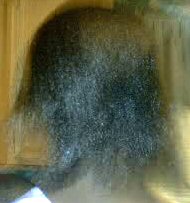
73% of AA women complain of breakage, split ends, and dryness
 Relaxers Can Cause African Americans’ Hair Loss.
Relaxers Can Cause African Americans’ Hair Loss.
Author: DAMIAN McNAMARA
HERSHEY, PA — African American women who complain that their hair won’t grow may have relaxer-induced alopecia, Dr. Jeffrey J. Miller said at a meeting on contact dermatitis.
African Americans comprise almost 13% of the population in the United States but have a disproportionate incidence of hair and scalp disorders. Familiarity with the unique hair care regimens in this group can help the dermatologist properly manage alopecia caused by hair relaxers. “You miss the diagnosis if you don’t ask about hair care routine,” Dr. Miller said.
Relaxers come in two general formulations: lye relaxers containing sodium hydroxide, which are most often used by hair care professionals; and no-lye relaxers, which contain the gentler guanine hydroxide for home use. Although these products straighten hair permanently they must be reapplied periodically as new hair grows.
Exactly how relaxers work is unknown, although it is believed the high pH of the products causes the cuticle layer of the hair shaft to open as the hair swells, and allows the product to enter the hair cortex. Disulfide bonds within the hair cortex are broken and rearrange into a configuration that straightens the hair.
Many relaxers are used without a problem, Dr. Miller said, but the risk of alopecia and other conditions is high because the application of the products must be timed precisely based on a number of factors, including hair thickness.
In fact, “73% of African American women complain of breakage, split ends, and dryness caused by relaxers,” said Dr. Miller, a dermatologist at the Milton S. Hershey Medical Center in Hershey.
“Relaxer-induced alopecia occurs more on anterior and posterior hairlines, where hairs are thinnest,” Dr. Miller explained. In addition, relaxers are often first applied along each hairline, thereby increasing the exposure time in these areas. Hair breakage, most often involving trichorrhexis nodosa, can also be found on the crown and throughout a patient’s entire scalp, he noted at the meeting, sponsored by Pennsylvania State University and the American Contact Dermatitis Society.
Patients with relaxer-induced hair loss may complain that their hair will not grow or is falling out, when in fact their hair is fragile and breaking off. Hair of different lengths along the front hairline can be a sign of such damage. Dr. Miller suggested taking a lock of hair and putting it between two layers of gauze, rubbing the gauze between two fingers, and observing whether the hair is broken.
Advise patients to wait at least 6 weeks between relaxer applications, he said. “The only effective treatment is trimming of the damaged hair, allowing it to grow out. I usually recommend that patients go to a professional who can more safely apply the relaxer.”
Citation Details
Title: Relaxers Can Cause African Americans’ Hair Loss.
Author: DAMIAN McNAMARA
Publication: Skin & Allergy News (Magazine/Journal)
Date: September 1, 2001
Publisher: International Medical News Group
Volume: 32 Issue: 9 Page: 26


